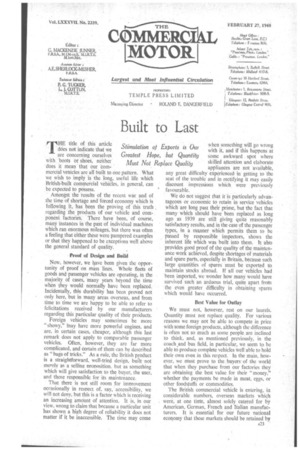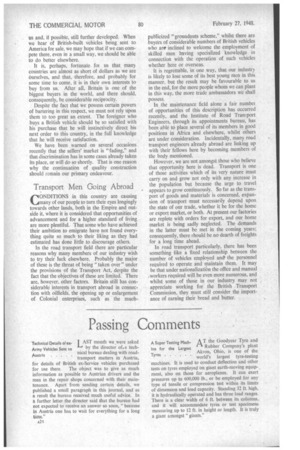Built to Last
Page 25

Page 26

If you've noticed an error in this article please click here to report it so we can fix it.
THE title of this article does not indicate that we are concerning ourselves with boots or shoes, neither does it mean that our tommercial Vehicles are all built to one pattern. What we wish to imply is the long, useful life which British-built commercial 'vehicles, in general, can be expected to possess.
Amongst the results of the recent war and of the time of shortage and forced economy which is following it has been the proving of this truth regarding the products of our vehicle and component factories. There have been of course, many instances in the past of individual machines which ran enormous mileages, but there was often a feeling that either these were pampered examples or that they happened to be exceptions well above the general standard of quality.
• Proof of Design and Build Now, however, we 4ave been given the opportunity of proof on mass lines. Whole fleets of goods and passenger vehicles are operating, in the majority of cases, many years beyond the time when they would normally have been replaced. Incidentally, this durability has been proved not only here, but in many areas overseas, and from time to time we are happy to be able to refer to felicitations received by our manufacturers regarding this particular quality of their products.
Foreign vehicles may sometimes be more "showy," bay have more powerful engines, and are, in certain cases, cheaper, although this last remark does not apply to comparable passenger vehicles. Often, however, they are far more complicated, and certain of them can be described as "bags of tricks." As a rule, the British product is a straightforward, well-tried design, built not merely as a selling Proposition. but as something which will give satisfaction to the buyer, the user, and those responsible for its maintenance.
That there is not still room for improvement occasionally in resnect of, say, accessibility, we will not deny, but this is a factor which is receiving an increasing amount of attention. It is, in our view, wrong to claim that because a particular unit has shown a high degree of reliability it does not matter if it be inaccessible. The time may come when something will go wrong with it, and if this happens at Some awkward spot where skilled attention and elaborate appliances are not available, any great difficulty experienced in getting to the seat of the trouble and in rectifying it may easily discount impressions which were previously favourable.
We do not suggest that it is particularly advantageous or economic to retain in service vehicles which are long past their prime, but the fact that many which should have been replaced as long ago as 1939 are still giving quite reasonably satisfactory results, and in the case of the passenger types, in a manner which permits them to be passed by responsible inspectors, shows the inherent life which was 'built into them. It also provides good proof of the quality of the maintenance work achieved, despite shortages of materials and spare parts, especially in Britain, because such large quantities of spares must be exported to maintain stocks abroad. If all our vehicles had been Imported, we wonder how many would have survived such an arduous trial, quite apart from the even greater difficulty in obtaining spares which would have occurred.
Best Value for Outlay We must not, however, rest on our laurels. Quantity must not replace quality. For various reasons we may not be able to compete in price with some foreign products, although the difference is often not so much as some people are inclined to think, and, as mentioned previously, in the coach and bus field, in particular, we seem to be able to produce complete vehicles well able to hold their own even in this respect. In the main, however, we must prove to the buyers' of the world that when they purchase from our factories they are obtaining the best value for their "money," whether the payments be made in meat, eggs, or other foodstuffs or commodities.
The British commercial vehicle is entering, in considerable numbers, overseas markets which were, at one Otte, almost solely catered for by American, -German, French and Italian manufacturers. It is essential for our future national economy that these markets should be retained by us and, it possible, still further developed. When we hear of British-built vehicles being sent to America for sale, we may hope that if we can compete there, even in a small way, we should be able to do better elsewhere.
It is, perhaps, fortunate Lot us that many countries are almost as short of dollars as we are Ourselves, and that, therefore, and probably for some time to come, it is in their own interests to buy from us. After all, Britain is one of the biggest buyers in the world, and there should, consequently, be considerable reciprocity.
Despite the fact that we possess certain powers of bartering in this respect, we must not rely upon them to too great an extent. The foreigner who buys a British vehicle should be so satisfied with his purchase that he will instinctively direct his next order to this country, in the full knowledge that he will receive satisfaction.
We have been warned on several occasions recently that the sellers' market is "fading," and that discrimination has in some cases already taken its place, or will do so shortly. That is one reason why the continuatiOn of quality construction should remain our primary endeavour.
Transport Men Going Abroad
CONDITIONS in this country are causing many of our people to turn their eyes longingly towards other lands, both in the Empire and outside it, where it is considered that opportunities of advancement and for a higher standard of living are more plentiful. That some who have achieved their ambition to emigrate have not found everything quite so much to their liking as they had estimated has done little to discourage others.
In the road transport field there are particular reasons why many members of our industry wish to try their luck elsewhere. Probably the major of these is the threat of being "taken over" under the provisions of the Transport Act, despite the fact that the objectives of these are limited. There are, however, other factors. Britain still has considerable interests in transport abroad in connection with oilfields, the opening up or enlargement of Colonial enterprises, such as the much publicized "groundnuts scheme," whilst there are buyers of considerable numbers of British vehicles who are inclined to welcome the employment of skilled men having specialized knowledge in connection with the operation of such vehicles whether here or overseas.
It is regrettable, in one way, that our industry Is likely to lose some of its best young men in this manner, but the result may be favourable to us in the end, for the more people whom we can plant in this way, the more trade ambassadors we shall possess.
In the maintenance field alone a fair numbet of opportunities of this description has occurred recently, and the Institute of Road Transport Engineers, through its appointments bureau, has been able to place several of its members in good positions in Africa and elsewhere, whilst others are under consideration. Incidentally, many road transport engineers already abroad are linking up with their fellows here by becoming members of the body mentioned. However, we are not amongst those who believe that opportunity here is dead. Transport is one of those activities which of its very nature must carry on and grow not only with any increase in the population but because the urge to travel appears to grow continuously. So far as the transport of goods and materials is concerned, expansion of transport -must necessarily depend upon the state of our trade, whether it be for the home or export market, or both. At present our factories are replete with orders for export, and our home market is being sadly neglected. The demands in the latter must be met in the coming years; consequently, there should be no dearth of freights for a long time ahead.
In road transport particularly, there has been something like a fixed relationship between the number of vehicles employed an& the personnel required to operate and maintain them. It may be that under nationalization the office and manual .rworkers required will be even more numerous, and whilst some of those in our industry may not appreciate working for the British Transport Commission, they must still consider the importance of earning their bread and butter.




















































































